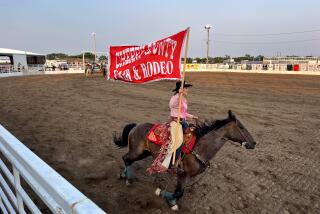Where Land and Cash Are Freebies
- Share via
HAZELTON, N.D. — In these wide-open spaces, dairy farmer Kent Weiser would like nothing more than to see a traffic jam or two. For others, it would be great to hear the excited cries of children playing in the schoolyard.
Hazelton, a farming community of about 240 people in south-central North Dakota, is doing its best to stay on the map in a state that has seen its population slide in recent years. It is one of a growing number of communities in Plains states attempting to entice people and businesses to move to rural areas by offering incentives such as free land and cash.
So far, there have been no takers for Hazelton’s offer, but interest has come from as far away as Alaska.
“If we don’t do something, we fail,” Weiser said.
Some Hazelton residents are quick to point out that there are only three pregnant women in town.
The Hazelton Development Corp., a determined group of city leaders, began running ads in November offering families up to two free lots and $20,000 toward home purchases. Businesses are offered free lots and up to $50,000 for setting up shop in the town about 35 miles southeast of Bismarck.
“We’re interested in having young families move here,” said Bev Voller, a member of the nonprofit development group, funded largely through private money. “Our goal is to increase enrollment at the school and repopulate the city.”
Kim Preston, spokeswoman for the advocacy group Center for Rural Affairs in Lyons, Neb., said the phenomenon of land giveaways started in the last couple of years.
Rural towns are “trying whatever will work,” she said. “They’re finding it harder and harder trying to keep young people in their communities.”
Preston said a recent study found that 698 mostly rural counties in the United States have had “a net migration loss of at least 10%.”
Some rural communities have had better results than others in luring people and companies. One success story is Marquette, Kan., where the city began giving away land about two years ago to families willing to build homes there.
Marquette Mayor Steve Piper said that 24 new homes had been built. The city’s population has jumped from 527 to 650 in the last two years, and school enrollment has increased to about 150, up from 118.
“The big thing was it has kept our school open,” Piper said. “We were on the verge of losing it.”
James and Donna Colley moved to Marquette last year from Los Angeles.
“I love it, and I wouldn’t go back,” she said. “We moved here because of the free land. The prices of homes in California are outrageous.”
The couple’s four children are “excelling in school because of the high teacher-to-student” ratio.
“So it might get a little cold, but that’s a small price to pay for being able to leave your doors unlocked,” she said. “I would recommend it to anybody who wants to get away from the busy city life.”
Sens. Byron L. Dorgan (D-N.D.) and Chuck Hagel (R-Neb.) are rooting for rural communities. They have been trying since 2001 to get the New Homestead Act passed.
The proposal, still languishing in the Senate, would repay 50% of college loans, up to $10,000, for graduates who spend five years living and working in sparsely populated areas. It also would give tax breaks to home buyers and businesses that move to some rural areas.
“It’s a fairly big idea that has taken a while to take root,” Dorgan said. “Fourteen senators are cosponsors, and most of them come from states that are losing population in rural areas.”
Residents of Hazelton, whose population peaked in the 1940s at about 500 people, voted in 1997 to build a $3.2-million school, which also draws students from the nearby towns of Moffit and Braddock. Now the locals worry that without new families, the school will have to be shuttered.
“If the school dies, the town disappears,” said Tom Weiser, a former teacher and member of the development group.
Hazelton is showing signs of promise, however.
A $1.3-million mall opened last year. It houses a grocery store whose owners moved from central Illinois to farmland they owned in the area, a coffee shop, a beauty salon and a company that manufactures wool products.
Linae Enockson’s grandmother and five great-aunts had lived in the area about 80 years ago. She fell in love with Hazelton during a visit and moved from Minneapolis this year to open Dacotah Woolen Mills & Five Sisters Dry Goods. Her company has added about a dozen jobs since it opened in June.
Down the street, the Bucking Mule Saloon opened in 2005 after the town had been without a bar for two years.
“We needed a gathering place,” and the saloon has lured many visitors, said Yvonne McLeish, a former flight attendant and president of the development group.
Hazelton has much to offer, including hunting, fishing and elbow room, say residents who are banking on the cash incentives and land to make the mix irresistible.
“This is a place where you never have to lock your door or take your keys out of your pickup,” Tom Weiser said.
More to Read
Sign up for Essential California
The most important California stories and recommendations in your inbox every morning.
You may occasionally receive promotional content from the Los Angeles Times.












